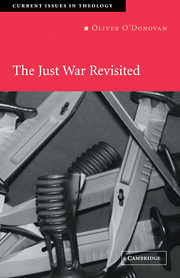6 - Afterword: without authority
Published online by Cambridge University Press: 05 June 2012
Summary
In the memory of a life not over-stocked with drama a morning in January 1991 stands out, when my scheduled annual lecture series on the ethics of war opened just a few hours after the beginning of Operation Desert Storm for the liberation of Kuwait. An attendance several times the modest size usually expected for this subject shared the moment with me, and accompanied me through the term – until the military action ended before I did, when it fell away to more pacific pursuits. As the campaign proceeded, my habitual lectures were in need of daily rewriting, with new material for discussion thrust upon me by the unfolding events. It seemed as though the dream of the sixteenth-century fathers of ‘just war’ was in course of realisation as we talked about it: the conversion of bilateral conflict into an ordered exercise of third-party jurisdiction, enforced under international legal and moral norms.
The large attendance had its ludicrous aspect, conjuring up the picture of an earnest male student reaching for his textbook on sexual morality with his sweetheart already perched upon his knee, and shelving it again as she kissed goodbye. But it soon became apparent that Oxford students had no monopoly on a kind of absent-mindedness with respect to the great ethical issues of war and peace. The controversies that raged in the church and media before, during and after that military enterprise were at once furious and forgetful. I found myself in something of a minority in thinking that something excitingly new was transpiring.
- Type
- Chapter
- Information
- The Just War Revisited , pp. 124 - 136Publisher: Cambridge University PressPrint publication year: 2003

